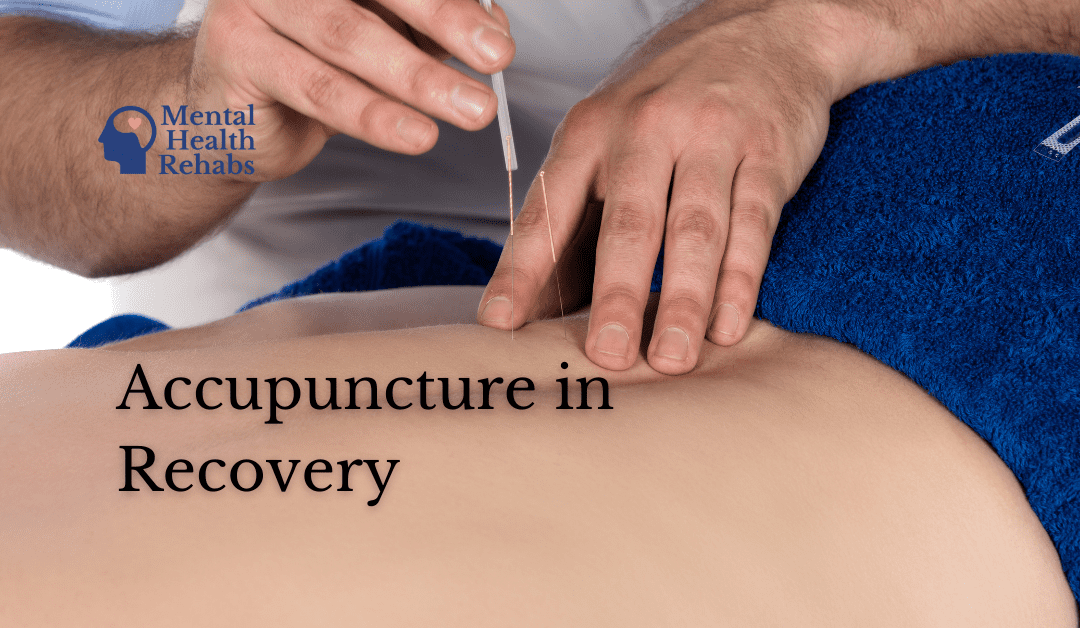Acupuncture is an ancient practice that originated in China over 2,500 years ago. Now, in modern times, it’s been embraced by Western culture as a way to alleviate various ailments. Once limited to spas and massage parlors, acupuncture is no longer just beloved as part of lavish self-care. Acupuncture and recovery are an increasingly common combination due to a rising interest in holistic addiction treatment and four key benefits of acupuncture for addiction.
What does acupuncture do?
Acupuncture is the act of inserting ultra-thin needles into specific points on the body through which energy, or “qi,” flows. According to traditional Chinese medicine, various physical and mental health issues occur when these points become blocked. Acupuncture thereby restores the flow of qi by stimulating specific points.
Nowadays, acupuncture is used for pain relief and promoting healing. During an acupuncture session, a trained practitioner will insert thin, sterile needles into these points, where they’re typically left in place for a short time. This process can help reduce inflammation, boost circulation, and promote the release of endorphins, the body’s natural painkillers.
Acupuncture Benefits in Addiction Treatment
For individuals recovering from addiction, acupuncture can be a powerful tool in their
journey toward sobriety. While acupuncture alone is not a cure for addiction, it can
complement other forms of treatment by reducing cravings, easing withdrawal
symptoms, and supporting overall well-being.
1. Pain Relief
Studies have shown that acupuncture can be effective in treating conditions such as
migraines, back pain, arthritis, and fibromyalgia. It can also be used to ease any discomfort related to withdrawal. The greatest benefit, however, is that it’s a natural and non-invasive method of pain relief, reducing the need for medication that can carry the risk of addiction or other unwanted side effects and offering an effective pain relief alternative for pregnant women.
2. Improve Mood
Research has shown that acupuncture can activate the release of endorphins, which not only provide pain relief but also produce feelings of relaxation and pleasure. By stimulating these natural opioids, acupuncture can help reduce the reliance on external substances and support the recovery process.
3. Reduce stress
Acupuncture can play a valuable role in supporting mental health during the recovery process as well. It has been shown to reduce stress levels by stimulating the production of serotonin and other neurotransmitters that promote relaxation and a sense of well-being. This, in turn, can reduce symptoms of anxiety and depression, which are common among those in recovery.
4. Improved circulation
Acupuncture has been shown to improve the flow of both oxygen and blood in the body, which helps the nervous system function more efficiently and regularly. This can be really helpful to individuals in the early stages of addiction recovery whose bodies are still readjusting to a new normal.
5. Improve sleep quality
Research has found that acupuncture increases levels of GABA neurotransmitters, a calming chemical naturally produced in the brain, similar to the effect of sedative drugs like benzodiazepines. Acupuncture is so effective at improving both sleep quality and duration that it’s often used as a treatment for insomnia.
Should you consider acupuncture as part of your addiction treatment?
Acupuncture is part of a rising interest in holistic addiction treatment, which is a treatment that incorporates all aspects of a person’s well-being — the social, spiritual, and emotional — not just the physical. Acupuncture provides a gentle yet effective way to restore vitality and promote self-care. You can enhance your healing journey and achieve a greater sense of well-being.
If you are considering incorporating acupuncture into your recovery plan, look for a qualified and experienced practitioner who’s also knowledgeable about working with individuals in recovery. Nowadays, there are a growing number of addiction treatment centers that offer acupuncture as part of their available treatment options, which can take the guesswork of finding the right practitioner.
Whether you’re planning on incorporating acupuncture into your recovery plan through a formal treatment center or on your own, keep in mind that it’s a complementary therapy, not a standalone solution. Acupuncture works best when combined with other evidence-based treatments, such as therapy, medication, support groups, and lifestyle changes.
If you’re experiencing major discomfort or psychological distress, it may be more beneficial to talk to a mental health professional instead. They can help you talk through the source of your stress, anxiety, or sleeplessness and provide longer-term solutions to these issues in the form of medications or evidence-based coping strategies. While acupuncture has many benefits, acupuncture is not a substitute for professional medical advice or treatment.
Sources:

